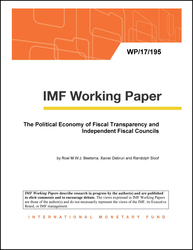
The Political Economy of Fiscal Transparency and Independent Fiscal Councils
The global surge in independent fiscal councils (IFCs) raises three related questions: How can IFCs improve the conduct of fiscal policy? Are they simultaneously desirable for voters and elected policymakers? And are they resilient to changes in political conditions? We build a model in which voters cannot observe the true competence of elected policymakers. IFCs’ role is to mitigate this imperfection. Equilibrium public debt is excessive because policymakers are “partisan” and “opportunistic.” If voters only care about policymakers’ competence, both the incumbent and the voters would be better off with an IFC as the debt bias would shrink. However, when other considerations eclipse competence and give the incumbent a strong electoral advantage or disadvantage, setting up an IFC may be counterproductive as the debt bias would increase. If the incumbent holds a moderate electoral advantage or disadvantage, voters would prefer an IFC, but an incumbent with a large advantage may prefer not to have an IFC. The main policy implications are that (i) establishing an IFC can only lower the debt bias if voters care sufficiently about policymakers’ competence; (ii) not all political environments are conducive to the emergence of IFCs; and (iii) IFCs are consequently vulnerable to shifts in political conditions.
Publication date: September 2017
ISBN: 9781484315552
$18.00
Add to Cart by clicking price of the language and format you'd like to purchase
Available Languages and Formats
| English |
Prices in red indicate formats that are not yet available but are forthcoming.
Topics covered in this book
This title contains information about the following subjects.
Click on a subject if you would like to see other titles with the same subjects.
Independent fiscal councils , Fiscal transparency , public debt , partisan bias , opportunistic bias , competence , congruence
Summary
Copyright © 2010 - 2024
Powered by:
AIDC



